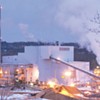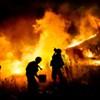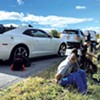Published March 8, 2023 at 10:00 a.m. | Updated April 11, 2023 at 2:33 p.m.
Now a Super Listener
I've started listening to Seven Days Aloud and want to express my enjoyment with this other option you provide. The fact that you have selected stories from the past, as well, is wonderful.
Thank you from a Super Reader who is now also a Super Listener.
John Edgar King
North Hero
That's Ukraine
The photo captions accompanying the "Frontline Shooter" article [February 24] are wrong. The photos are all taken in Ukraine. Some in Russian-controlled Ukraine, true, but it's Ukraine nonetheless.
Following its invasion of Ukraine in 2014, Russia established Quisling regimes in the occupied Donbas. These self-proclaimed "republics" were run by armed groups of Russians and local collaborators sponsored and directly supported by Russia.
These regions were no more independent "people's republics" than a log cabin is maple syrup. They are Ukraine.
Jurij Homziak
Burlington
Immigration Isn't 'Illegal'
[Re "Northern Exposure: Illegal Crossings on the Vermont-Canadian Border Are Soaring," February 13]: We are disheartened that Seven Days chose to engage in dog whistling about the end of Title 42. As leaders of immigration legal service organizations, we see the chilling effect of the casual and incorrect use of the word "illegal" when used to describe people crossing borders for refuge in pursuit of rights guaranteed by our country's laws.
Congress long ago made clear there is no illegal way to seek asylum. Any noncitizen, even when crossing the border without inspection, has an unqualified right to seek asylum. Dismissing border crossers as "illegal" is not only factually incorrect, it normalizes the dehumanization of people whose legal rights the federal government has violated since 2020 with no relation to the public health justifications our now-maskless government claims.
We're disappointed that Seven Days published this article during Black History Month, with no mention of the ongoing victimization of Black asylum seekers by Title 42. Instead, the paper wrings its hands about the plight of the nation's largest civilian police force. Our immigration system was born of race-based scapegoating aimed at pacifying a dispossessed native-born working class, and these ongoing distractions continue to have flesh-and-blood consequences.
At a time when Vermont's health and housing benefits are being cut, please don't ask the struggling majority to swallow the message that the blame for our scarce resources lies with asylum seekers. Immigration justice advocates are working hard to support people coming to Vermont to seek asylum. We are proud of that work and happy to discuss it anytime.
Kate Paarlberg-Kvam
Manchester
Paarlberg-Kvam is the executive director of the Community Asylum Seekers Project in Brattleboro and co-coordinator of the Vermont Asylum Assistance Project.
Jill Martin Diaz
Burlington
Martin Diaz is lead attorney of Vermont Immigrant Assistance and an assistant professor at Vermont Law & Graduate School in South Royalton.
Great EMS Article
I've been working as a paramedic for 10 years in the central Vermont area, and ["On Life Support," March 1] was the best piece I've ever read regarding EMS in the state. Thank you, thank you, thank you for capturing the difficulty and the nuance so well.
Devin Krevetski
Northfield Falls
Ask the Dishwasher
[Re "Penny-Wise Pioneer: A Colchester Café Serves Big Flavors for Small Prices," February 22]: I suggest Seven Days include observations about the working conditions when you review restaurants. It would be simple enough to include the wages of the dishwasher on duty or the longevity of the staff as an indication of job satisfaction or the approach on tipping and equity among workers. A meal tastes better when you know the people preparing, serving and cleaning up are fairly compensated. When I'm "Dining on a Dime," I'd like to know how the dimes flow.
Chuck Lacy
Jericho
'Do Not Demolish'
Thank you for ["Religious Conversion: Vermont's Old Churches Offer Potential for New Enterprises — If They're Not Demolished First," February 15]. St. Stephen's and Burlington cathedrals both have such potential if repurposed. Both would continue to serve the communities that love them. Do not demolish.
Ruth Furman
Jericho
In Defense of Books
[Re "Battle of the Books," February 22]: Vermont State Colleges System administrators who plan to de-book libraries and remove NCAA affiliation for sports teams need to be held accountable for incomprehensible incompetence.
In the guise of saving money, their plans gut the organism they claim to save. Is it far-fetched to suggest that removing books from libraries is comparable to burning books? How do they respond to the fact that only 10 percent of printed books are digitized and won't be preserved after the disaster? Has anyone given any thought to the availability of the digital world in the case of an extended collapse of the grid?
Students who are digitally literate need screen breaks. Entering the library, setting screens aside and pulling a book off the shelf provide not only a contemplative break from digitalia and decreased eye strain but also access to larger illustrations than screens allow. Decreased borrowing statistics are claimed as justification. How do you measure the value of reading a book off the shelf, making notes or copies, and putting it back on the shelf, not taking it out?
Planning by statistics alone is ignorant. It ignores the whole person and diminishes the timeless role and value of libraries as spaces for intellectual and holistic contemplation. Creative insights and incalculable learning come in a mighty way when glancing up from a book to look at a cloud out the window of the library.
Let's hope the arrogance and ignorance is atoned for quickly by the announcement of a revised plan.
Michael Caldwell
North Wolcott
Power of Print
[Re "Battle of the Books," February 22]: No one has addressed what the loss of physical books, which can be checked out and taken home, will do to a student population in areas that do not have reliable — or any — internet access.
Zoe Bishop
Winooski
Words Matter
[Re "Poet and Translator Robin Myers Receives NEA Grant," February 1]: I am not a translator but a physicist who speaks several languages, and I have often been asked by my academic colleagues for help with translations needed for their work. The comments of Benjamin Aleshire about Robin Myers' translation of Daniel Lipara's poetry from Spanish into English brought to mind my own efforts to improve the translation of an article written by Fang Lizhi, the widely known astrophysicist and human rights activist, forced into exile from China in 1989. He asked me to revise one of his physics articles and rework the sentences into publishable form.
In sharp contrast to the procedure adopted by Myers and applauded by Aleshire, I made no effort to transform Fang's then somewhat clumsy English into sentences "so smoothly that the English pages often don't feel like a translation at all." Instead, I merely corrected Fang's grammatical errors, but I let stand instances of his non-idiomatic vocabulary and syntax, to reveal his struggles with the new language he was now adopting. I did this out of respect for Fang and to preserve the historical context of his work and his efforts to rebuild his shattered career in a new foreign milieu.
From the sample of Myers' translation of "la isla Lipari," it is clear that Myers is good at constructing well-polished sentences, but she shows far too little respect for Lipara's poetry. She rashly transmogrifies Lipara's praise of the delicious taste of the fruits to praise of the abundance and sumptuousness of these fruits — delicious taste be damned. Lipara's description of the fruits is the delicate rhapsody of a gourmet, whereas Myers' translation is the greedy rumination of a gourmand. Maybe Myers is trying to appeal to the preferences of the American populace?
Hans Ohanian
Charlotte
VEGI Farms?
It is heartbreaking to read about the plight of Vermont's organic dairy farmers. Small farmers are frontline protectors of our climate and food resiliency yet struggle to make a decent living and keep their products accessible to their communities. So, the Northeast Organic Farming Association of Vermont and other advocates beg for emergency relief to allow some to survive 'til spring.
Despite their sympathetic reception, state officials find themselves powerless to address the root causes of this situation. How can we spare millions for the farmers that still won't make them financially viable, while multiple other crises of poverty and injustice clamor for attention?
[In "Vermont Lawmakers Question Job-Creating Subsidies at a Time of Low Unemployment," February 6], Seven Days examined the Vermont Employment Growth Incentive, aka VEGI, program, which provides subsidies for businesses to create "good" jobs — which in this time of labor force shortages seems like a poor expenditure. Wait! How about allocating that money to saving some of the "good" jobs that are in peril of being lost? Or does the state not consider farming to be a "good" job?
The multiple crises we face have much to do with the colonial mindset that smallholder farmers should be encouraged (often forced) to give up their independence and move to the city in pursuit of "good" jobs. Perhaps by reversing that equation and investing in our farmers instead of purveyors of gadgets and consumer goods, we can begin a new commitment to the health of our soil and water, and thereby the health of our environment and human communities.
Grace Gershuny
Barnet
First Constable at Town Meeting
You might see me at Town Meeting
standing at the back of our elementary
school gym. No badge. No special
uniform. Dressed in Carhartt pants
and a hunter's red, plaid vest.
Even when it's true I'm no hunter
and hold no grudges for those that do.
During bow-and-arrow season.
Which is a polite and skillful way
to take down a deer. Butcher it to fit
inside a freezer. Later, let it marinate —
I mean the doe — until
the venison's tender as a pat
of butter. One of my neighbor's
slow-cooking in a crockpot
in our town hall lobby.
For anyone who wants a taste
of game. Who won't be offended
by knowing how it came to be here.
Like me, I'm thinking, for fifty years
now. A true flatlander. Originally
from Boston. A city of muskets
and roasted pheasants. Of boiled
corned beef and cabbage.
Of North End pasta and Brookline
bagels. Of breaded pieces
of Roxbury fried chicken.
On duty, I shouldn't be
remembering now.
When it's my only charge
as their first constable. To pay
attention to all my neighbor-
citizens, as they stand to voice
their dear opinions.
Without getting too rowdy.
Which, if one of them did,
say the one wearing antlers
or the professor going on
and on as if he was standing
at a faculty meeting,
it would be me the moderator
calls on next. To escort
them to the room for
kindergartners. To cool off.
To remember where they are.
Where the deer lie down
back there in the Cornwall swamp.
Where on this day every year
at Town Meeting in our Vermont,
we vote for the life we want.
We can afford or not. With just
a first and second constable.
Gary Margolis
Cornwall
Trees and Forest
[Re "Burlington Considers Kicking Fossil Fuels to the Curb," March 1]: The quote from the Burlington Electric Department is interesting. In fact, gas-generated electric will emit less CO2 in the atmosphere than wood chips, not more. But Burlington Electric pretends like this carbon doesn't exist. Also, as another person in the article noted, there will be fewer trees to reabsorb the carbon when we burn them for energy. These are facts. When we burn wood, it is mined from the forest, not the ground. That's the difference.
But it's more complicated than that. Living wood left in the forest not only stores carbon but also continues to capture more carbon each year. As a forest left "unmanaged" grows older, it actually increases its rate of capture up to 60 to 80 years old, then levels off at maximum capture rate for another century or more. This is why industrial burning of wood is so bad for the environment. The "renewable" feature takes 100 years to catch up. It puts land into early successional habitat that can only capture a fraction of the carbon that mature forests can capture. We don't have 100 years.
Phillip Merrick
Burlington
More By This Author
Comments
Comments are closed.
From 2014-2020, Seven Days allowed readers to comment on all stories posted on our website. While we've appreciated the suggestions and insights, right now Seven Days is prioritizing our core mission — producing high-quality, responsible local journalism — over moderating online debates between readers.
To criticize, correct or praise our reporting, please send us a letter to the editor or send us a tip. We’ll check it out and report the results.
Online comments may return when we have better tech tools for managing them. Thanks for reading.


















































